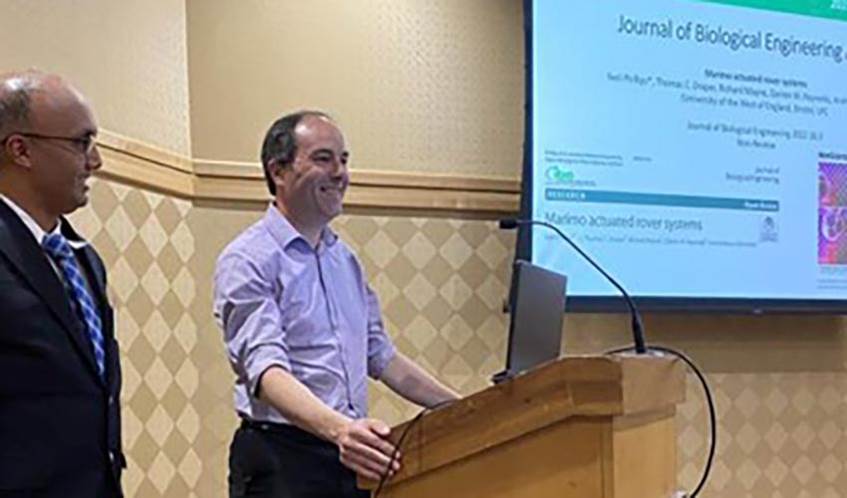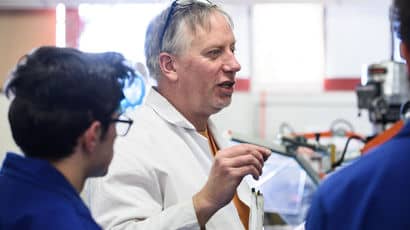Algae ball research recognised with international biological engineering award

Research by a UWE Bristol academic that demonstrates how balls of algae can be transformed into eco-friendly underwater robots capable of carrying out surveying and exploration tasks has been recognised with a prestigious award.
Dr Neil Phillips, a Senior Research Fellow working in the university’s Unconventional Computing Laboratory, has been awarded with Publication of the Year (2022) in the Research category by the Institute of Biological Engineering.
The winning academic paper explains how marimo, a type of algae that grows in the shape of a ball in lakes in Japan and Europe, can be turned into a ‘biological rover’ (or bio-rover) which can propel itself along a river or lake bed when encased in a 3D-printed plastic shell designed by Dr Phillips and his team.
When exposed to sunlight, marimo produces tiny oxygen bubbles. With the marimo fitted inside in a cleverly-designed spherical plastic shell, these bubbles become trapped and push the rover along the ground. The rover follows the path of the sun and floats up and over any obstacles in its way.
If the technology is further developed, Dr Phillips said the autonomous rovers could be fitted with sensors, trackers and cameras to collect data and images for applications in underwater environmental monitoring and surveying. Requiring no battery power, the rovers are a sustainable form of technology harnessing a naturally occurring process and also benefit from being extremely low-cost.
Dr Phillips said that a synthetic version of the rover – replicating the natural processes of marimo - could later be developed using manmade materials and powered by solar panels. If successful, Dr Phillips believes this technology could be used to explore dry terrain and even potentially to survey other planets. Based on feedback from NASA, Dr Phillips is currently working on a land-based version of the rover for his next academic paper.
Dr Phillips, who collected his award last month at the Institute of Biological Engineering Annual Conference hosted at Iowa State University, said: “With sensors fitted, the rovers could measure temperature, water quality or dissolved oxygen levels. They could collect huge amounts of data and would avoid the need for diving teams to go into the water, which is impractical and can disturb wildlife. Cost is also a major benefit – it can be as much as £100,000 for a robot (tied to a ship or land) to carry out environmental monitoring. Our rovers can be made for as little as £25.”
Dr Phillips added: “The technology is a win-win because it’s low-cost and sustainable. The rover moves slowly and steadily under the water and doesn’t suffer with any issues of unreliability you might experience using a battery for power.
“The basic bio-rover uses the direction of sunlight as a 'reference' which it rolls away from. Therefore, users simply drop the bio-rover at a suitable location for it to roll to the desired location for collection. By way of example, if you wanted to conduct an environmental survey of Lake Akan in Japan, you would release the bio-rovers (with desired instrumentation inside) on one side of the lake and collect on the other.”
A team of UWE Bristol masters students studying computer science are developing a simulator to model future versions of the bio-rover on exploration and environmental monitoring missions.
Related news

14 June 2023
Researchers monitor autonomous bus user experience as UK's first zero emission service launches new route
Researchers monitor autonomous bus user experience as UK's first zero emission service launches new route.

12 May 2023
Autonomous bus service launches as part of project assisted by Bristol Robotics Laboratory
One of most ambitious and complex autonomous bus services worldwide has been launched on the Forth Road Bridge near Edinburgh.
You may also be interested in

Media enquiries
Enquiries related to news releases and press and contacts for the media team.

Find an expert
Media contacts are invited to check out the vast range of subjects where UWE Bristol can offer up expert commentary.






